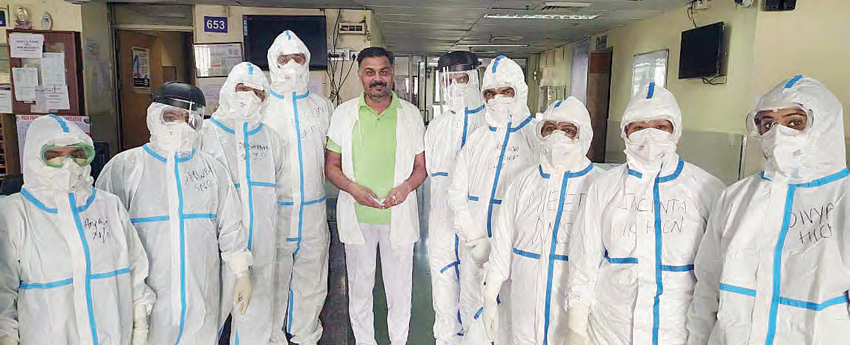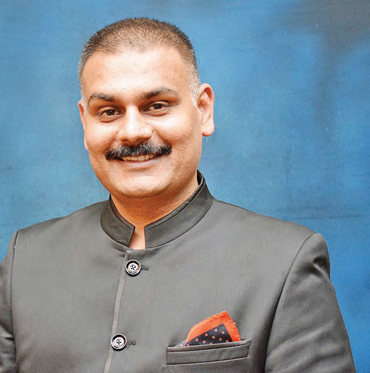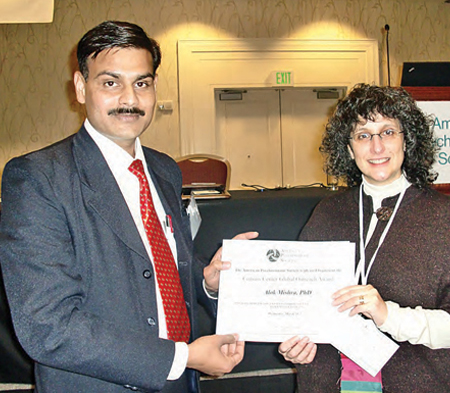Helping patients fight COVID-19 BLUES

Dr Alok Mishra, Joint Secretary, Evaluation (Foreign Degrees) and Meetings, Association of Indian Universities (AIU) Delhi, the apex body of Indian universities battled with Covid-19, after having been brought to the All India Institute of Medical Sciences (AIIMS) Delhi in a critical condition. Being a psychologist, he used the power of psychology and positive energy to get back into action and elevated the depressing environment of the ICU and the ward where he was undergoing treatment, and spread positivity to other patients as well

Dr Alok Mishra, Joint Secretary, AIU, successfully battled with the Covid-19 infection in the ICU of the All India Institute of Medical Sciences (AIIMS) in Delhi. Being a Psychologist and a Post-Doctoral Fellow from AIIMS Delhi, he did not lay contented with the ventilator and medical attention provided to him during his hospitalisation. Instead, he used his knowledge of psychology to overcome the attack of the pandemic and spread positive thought in his ward too.
Dr Mishra tested positive for Covid-19 on 11th November but was advised to self-quarantine at home, as it was a mild attack. However, due to breathlessness, he was admitted on 17th November to the ICU of AIIMS Trauma Centre, Delhi.
POST-COVID-19 GLOOM
States Dr Mishra, “After a couple of days in the ICU, I began to feel better, but realised that the main impact of this viral disease was on the human mind. A sense of gloom and depression sets in. I decided to use my knowledge of Psychology to overpower this emotional obstacle. So, every night I began writing notes in my diary. I scripted positive thoughts to help overcome negativity. It helped me steadily recuperate and become strong enough to walk around in the ward. That’s when I saw that most patients were afflicted with the negative emotions of fear and distress that they would not recover from this crisis. Thus, the environment in the entire ward was depressing and low-spirited. I decided to change their mindset.’’
It was the most natural thing to occur to Dr Mishra, being one of the country’s well-acclaimed brain analysts. He has analysed the brains of celebrities on the National Geographic Channel’s ‘Mega Icons’ programme. The celebs he spoke about comprised the Late President APJ Abdul Kalam, spiritual leader Dalai Lama, IPS officer and politician Kiran Bedi and cricket superstar Virat Kohli, amongst others. Understanding the psychological wreckage that the pandemic must have created amongst patients, besides healthcare givers, he began interacting with them, spicing his interactions with humour and laughter. He urged them not to get cowed down by the disease by injecting positive thoughts to drive it away.
"After a couple of days in the ICU, I began to feel better but realised that the main impact of this viral disease was on the human mind. A sense of gloom and depression sets in. I decided to use my knowledge of Psychology to overpower this emotional obstacle"
 USA award in the year 2010, photograph with Shari R.
USA award in the year 2010, photograph with Shari R.Waldstein (American Psychosomatic Society, President)
POWER OF APPRECIATION
Also, says Dr Mishra, “I noticed that the morale of the health professionals, the doctors and nurses attending the patients, was also sinking. I thought that they should be fully motivated and appreciated to continue their selfless service to the patients. As it is, wearing the cumbersome PPE uniform, which does not allow them to drink or eat anything and bans them from going to the toilet, is a tough requirement. So I spoke with the patients and convinced them that we must acknowledge their services to us by greeting them cheerfully. I instilled in them the daily habit of clapping and welcoming whenever the medical or paramedical staff entered the ward.’’
Speaking about the outcome of such positive gestures, Dr Mishra explains, “Appreciation and gratitude lead to the feeling of happiness, positivity and hope. Scientifically, these acts stimulate the limbic system, leading to the secretion of dopamine, endorphins, oxytocin and serotonin that enhances the feelings of happiness, hope and positivity. Regular practice of these gestures stimulates acetylcholine release in the hippocampus that converts these experiences into long-term memory and becomes a part of the personality.
A doctor or a nurse would feel more inspired and find it well worth to do a job in which he or she is the most vulnerable to this deadly pandemic.’’
Dr Mishra received accolades from Prof. (Dr) Rajesh Malhotra, Chief, JPNA Trauma Centre. Dr Malhotra has stated, “He turned the entire ward into a state of positivity. He spread positivity and energised both patients and health caregivers.’’
Having gone through the suffering of Covid-19 himself, Dr Mishra says, “Due to the use of heavy steroids which are immune-suppressants, I felt very weak after I returned from the hospital. So much so that for a few days, I could barely walk. Steadily, I recuperated, but I realised that post-Covid-19 care is of utmost importance. To achieve that, we need pleasant rehabilitation centres in salubrious surroundings like hill stations where patients should spend a few days to completely recover themselves. Already, I’m exploring a few resorts and other centres which could be converted for this purpose. I’ve begun my campaigning by writing to the government.’’
"I noticed that the morale of the health professionals, the doctors and nurses attending the patients, was also sinking. I thought that they should be fully motivated and appreciated to continue their selfless service to the patients. I instilled in them (the patients) the daily habit of clapping and welcoming whenever the medical or paramedical staff entered the ward"
REWARD THE WARRIORS
In a proposal sent to the Prime Minister’s Office and the Ministry of Health and Family Welfare, Dr Mishra has stated that Corona warriors (healthcare givers) should get various kinds of bravery awards like defence force personnel do. A large number of healthcare workers including doctors are working in Covid hospitals on an ‘ad hoc’ basis, which does not give them the benefits that regular government employees get. Dr Mishra emphasises the need to pass on these benefits to the ad hoc workers, as their risk while serving Covid-19 patients is at par with that of regular employees. In case of the unfortunate death of these health givers, their families should be adequately compensated and one of the family members be given a government job. He has also suggested the establishment of Global Post Covid Rehabilitation Centres, as he believes that more such pandemics can occur in the near future.
So, what has been his learnings from Covid-19? He states, “I’ve realised that life is too precious and so one has to change one’s lifestyle for the better. I’ve started giving more importance to exercise and fitness. I have also become very particular about my diet. Earlier, I was not following timely diet schedules, often skipping a meal or the other due to indulgence in work. But now, I’ve regulated my eating habits. I also sleep early and not stay up late nights. All these goals must be achieved as we need to strengthen our immune system to fight this present pandemic, and any new ones that may strike in the future. Covid-19 has also taught me to be humble and be more ‘giving’ to the society that we live in.”
And then, there’s ‘long-haul Covid’!
Post-Covid-19 health complications are being reported in millions of people from across the world. According to experts, thrombosis is a common effect found in 30% of seriously ill coronavirus patients. “Long Covid-19” or “long haul Covid-19” is the name given to these spectra of disorders. The Centre for Disease Control (CDC) in the US reported in its own survey that at least 35% of those surveyed had not returned to their usual state of health. Post-Covid-19 Awareness is crucial, but it is not the focus in India still, as it struggles to control the spread of the virus. Currently, India has the world’s second-highest caseload. “Indian health authorities need to focus more on post-Covid-19 care,” Dr Mishra says, “especially, as the problem is bound to grow as more and more people recover from the virus.”
Post-Covid-19 respiratory illness is very common and various studies have suggested that even after being discharged, patients need proper consultation regarding their post-recovery care. “As Covid-19 is an evolving disease and the complete cycle of this infection is yet to be established, many patients have persistent or recurrent problems of cough, mild fever, malaise, weakness and breathing difficulties, which are together known as the post-viral syndrome. The rising pollution and changing weather conditions may also exaggerate this syndrome.